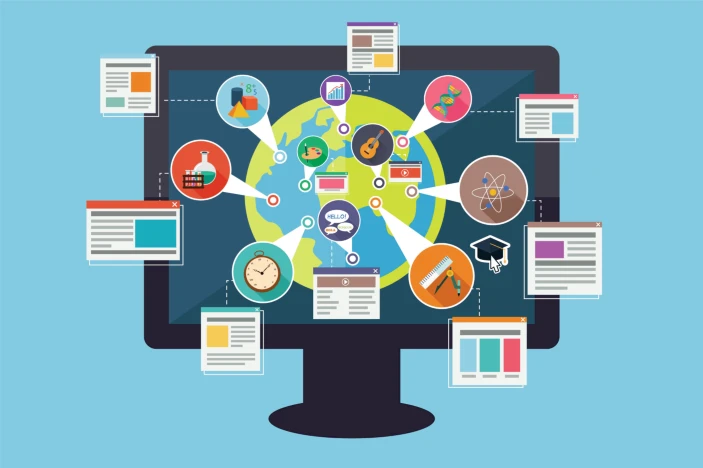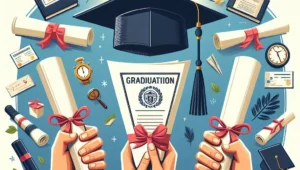Turning experience into professional diplomas and degrees is a fantastic way to leverage your existing skills and knowledge for career advancement. This approach allows you to validate your on-the-job learnings, potentially reduce the time and cost of formal education, and open doors to new opportunities. Whether you’re looking to gain a formal qualification in your current field or transition into a new one, there are several ways to translate your professional experience into academic credit.
Turn Experience Into Professional Diploma and Degree
Key Takeaways:
- Converting experiences into professional certifications and a diploma can accelerate your education and career path.
- By earning college credit for prior learning, you can save time and effort in completing your degree.
- Utilizing your work and life experiences can help you bypass redundant coursework and focus on developing your skills further.
- Obtaining a professional diploma can provide you with valuable credentials to validate your expertise in the job market.
- Efficiently leveraging your experiences can lead to faster career progression and increased job opportunities.
Understanding the Value of Prior Learning Assessment
In today’s competitive job market, individuals are constantly seeking ways to stand out and advance in their careers. One valuable opportunity that often goes unrecognized is the value of prior learning assessment, which allows individuals to showcase their knowledge and skills gained through work and life experiences.
Transcripts are a significant component of documenting one’s educational achievements, but they don’t have to be limited to traditional college-level coursework. Prior learning assessment recognizes that individuals can acquire college-level knowledge and skills through various avenues, such as on-the-job training, professional certifications, and self-study.
“The ability to earn college credit for work experience is a game-changer for those who have accumulated valuable skills and knowledge in their careers,” explains Laura Martinez, an education consultant at the College Credit Center. “It’s a way for individuals to receive the recognition they deserve and accelerate their educational journey.”
By undergoing a prior learning assessment, individuals can have their work experience evaluated for college credit. This assessment typically involves submitting a portfolio of evidence that demonstrates the alignment of their experience with college-level learning outcomes. This evidence can include professional certifications, work samples, performance evaluations, and even reflective essays.
“Prior learning assessments provide an opportunity for individuals to showcase their expertise and gain credit for the valuable experiences they’ve had,” says Dr. Mark Johnson, a professor of adult education at the University of State. “It allows them to bridge the gap between their practical knowledge and formal education.”
Through prior learning assessment, individuals can earn college credit for work experience and avoid redundant coursework, saving time and money. This process acknowledges the knowledge and skills individuals have acquired over the years, providing them with a pathway to further their education and advance their careers.
One aspect that sets prior learning assessment apart is its flexibility. It recognizes that learning happens in various contexts and goes beyond traditional classroom settings. This approach empowers individuals to take their learning into their own hands and gain recognition for their non-traditional educational experiences.
So, how can individuals take advantage of prior learning assessment and earn college credit for work experience? The first step is to research the institutions that offer this opportunity and understand their specific assessment process. Some institutions may have partnerships with professional organizations, making it easier for individuals with relevant certifications to receive credit. Others may conduct their internal assessments based on established standards.
It’s important to gather the necessary documents and evidence to support the assessment process. This may include official transcripts, professional certifications, letters of recommendation, and work samples. The more comprehensive and well-prepared the portfolio, the higher the chances of receiving college credit for work experience.
Once the prior learning assessment is complete, individuals will receive a transcript that reflects the college-level coursework they’ve been awarded credit for. This transcript can then be used to transfer credits to other institutions or as part of a future degree program.
Benefits of Prior Learning Assessment:
- Recognition of non-traditional learning
- Saving time and money by avoiding redundant coursework
- Accelerating educational journey
- Advancing career opportunities
Prior learning assessment opens the doors to new educational opportunities for individuals who have accumulated valuable skills and knowledge through work experience. By recognizing and awarding credit for their expertise, it empowers individuals to make the most of their professional journeys and take their education to the next level.
Exploring Different Paths to Earning College Credit
When it comes to earning college credit, there are various paths individuals can take to get closer to their educational goals. Whether you’re looking for credit toward a degree or want to earn credit for prior learning, there are several options available to suit different needs and circumstances.
Earning Credit Through the College-Level Examination Program (CLEP)
The College-Level Examination Program (CLEP) offers a convenient way for individuals to demonstrate their knowledge and earn college credit. By taking CLEP exams, individuals can receive credit for subjects they already have a solid foundation in, based on their own self-study or previous experience.
With a wide range of subjects available, from literature to mathematics, CLEP exams provide an opportunity for students to showcase their proficiency in specific areas and potentially earn college credit without taking a traditional course. This can be particularly advantageous for individuals who want to accelerate their education or save on tuition costs.

Earning Credit through Tuition-Based Programs
Another option for earning college credit is through tuition-based programs. Many colleges and universities offer these programs, allowing individuals to enroll in courses and earn credit toward their degree.
Tuition-based programs typically provide structured learning environments with dedicated instructors and course materials. This option can be beneficial for those who prefer a more traditional classroom experience and want to earn credit for the courses they complete.
Earning Credit for Prior Learning and Professional Certifications
In addition to CLEP exams and tuition-based programs, individuals can also explore opportunities for earning credit for prior learning and professional certifications. Many colleges and universities recognize the value and relevance of professional certifications and offer credit for specific certifications or degrees.
By leveraging their professional experiences and certifications, individuals can receive credit that is directly applicable to their educational pursuits. This not only saves time but also allows individuals to build upon their existing knowledge and skills in a degree-based program.
When considering credit for prior learning and professional certifications, it’s essential to research and understand the specific requirements and processes at each institution. Some institutions may have specific guidelines or evaluation methods in place to determine the amount of credit awarded for prior learning and certifications.
| Earning Method | Advantages | Considerations |
|---|---|---|
| CLEP Exams | – Save on tuition costs – Accelerate educational progress | – Requires self-study and preparation – Limited to specific subjects |
| Tuition-Based Programs | – Structured learning environment – Dedicated instructors | – May require additional tuition – Limited to specific courses offered |
| Credit for Prior Learning and Professional Certifications | – Recognizes real-world experience – Builds upon existing knowledge and skills | – Specific requirements and evaluation processes may vary – Not all certifications may be eligible for credit |
Overall, exploring different paths to earning college credit allows individuals to tailor their educational journey to their unique circumstances and goals. Whether through CLEP exams, tuition-based programs, or credit for prior learning and professional certifications, these options provide opportunities for individuals to make progress towards their degree and career aspirations.
Maximizing Opportunities for Credit Transfer
When it comes to advancing your education, maximizing opportunities for credit transfer can be a game-changer. By leveraging your skills, knowledge, and hands-on experiences, you can receive credit for the education and real-world experience you have gained outside of traditional classroom settings.
Transfer credits allow you to build upon the foundation you have already established, saving you time and resources. Instead of starting from scratch, you can pick up where you left off and accelerate your educational journey.
Transferring credits is particularly beneficial for individuals with extensive professional experience or those who have completed certifications or training programs. By recognizing the value of your hands-on experience and educational background, institutions can award you credit for the skills and knowledge you have acquired.
Leveraging Hands-on Experience
The ability to apply knowledge in practical settings is a valuable asset. Institutions understand the importance of hands-on experience and often reward it through credit transfer programs. Whether you have developed technical skills in your workplace or gained real-world experience through internships or volunteer work, these experiences can be converted into learning credits.
For example, if you have worked as a software developer, you can demonstrate your proficiency through projects you have completed and software systems you have designed. Your hands-on experience in the field can carry significant weight and be translated into college credits, allowing you to progress faster in your educational journey.
Recognizing Real-world Experience
Earning credits for real-world experience is another avenue for maximizing credit transfer opportunities. Many institutions offer programs that recognize the value of non-traditional learning experiences. These programs assess your prior knowledge and determine if it aligns with college-level coursework.
For instance, if you have gained extensive expertise in marketing through years of professional experience, you may be eligible for credits in marketing courses. By presenting evidence of your capabilities, such as portfolios, certifications, or case studies, you can demonstrate the skills and knowledge you have acquired in practice.
Exploring Educational Experience
In addition to professional experience, educational experiences beyond the traditional classroom can also be credited. If you have completed courses or training programs outside of a formal institution, they may be eligible for transfer credits.
For example, if you have obtained certifications in project management, these credentials can be recognized by institutions as evidence of your knowledge and skillset. These credits can be applied towards your degree program, reducing the number of courses you need to take and enabling you to progress faster towards your educational goals.
Conclusion
In conclusion, the ability to convert experiences into professional certifications and diplomas presents a valuable opportunity for individuals to advance their education and career paths. By recognizing the knowledge and skills gained through work and life experiences, individuals can earn college credit for their prior learning, which significantly accelerates their educational journey.
Through prior learning assessment, transcripts can reflect college-level coursework and provide individuals with the recognition they deserve for the skills they have acquired outside of traditional classroom settings. By leveraging their professional certifications and degrees, as well as other forms of experience credit, individuals can receive credit towards their desired degrees and certificates.
Maximizing opportunities for credit transfer is key in ensuring that the skills, knowledge, and real-world experiences individuals have gained are properly recognized. By doing so, individuals can avoid unnecessary duplication of coursework and build upon their educational foundation, saving both time and resources.
Converting experiences into professional certifications and diplomas not only opens doors to further education but also enhances career prospects. Employers value individuals who have invested in their education and have practical experience to bring to the table. By leveraging their prior learning, individuals can position themselves for greater success in their chosen fields.
FAQs
How do you convert experience to degree?
Converting work or life experience into college credit can help you earn your degree faster. Many online colleges offer the option to transfer experience credit toward a degree by earning college credit for your professional development. The American Council on Education and the College Board recognize the value of education and experience, allowing you to convert up to 30 credits of work experience toward a four-year degree. This means that your work experience degrees or certification programs can significantly reduce the time and cost of earning a college diploma. With four years of work experience, you may even be eligible for an associate degree or even a degree online.
Can I use my work experience to get a degree?
Many colleges offer college courses that allow students to earn work experience credit towards their degree credit. In some cases, this credit may be transferable to other institutions. By using their college experience as well as their work experience, students can earn experience college credits while pursuing a degree. This education or experience must be relevant experience to the degree program in order to qualify for college credit.
Students can then apply these credits toward a bachelor’s degree or even a master’s degree or associate’s degree. Having this degree on a resume can open up professional license opportunities. Some colleges, such as the University of Chicago Press, even offer featured online programs that allow students to earn credit based on their work experience.
How many years of work experience is equivalent to a degree?
Degree based programs provide students the opportunity to earn college credit for their work experience through prior learning programs. This means that the experience may be equivalent to a certain number of credits toward a degree. For example, a project management professional with 10 years of experience may be able to receive 90 credits toward their degree. Online learners can take advantage of credit for prior learning programs offered by the college board, which allow them to transfer credits toward their degree. These credit policies help students save time and money by recognizing their prior learning.
Which is better to do, a diploma or a degree?
Diploma or degree? When deciding between the two, it’s important to consider your goals and career path. Students earn a diploma in a shorter amount of time compared to a degree, which may be beneficial for those looking to enter the workforce sooner. However, a degree may offer more in-depth knowledge and expertise in a specific field, leading to better job prospects and higher earning potential. Some institutions offer programs that help students earn prior learning credit or credit for prior learning, allowing them to receive college credit for their work experience. For example, you may receive 12 credits toward your degree for experiences or training in specific areas.





